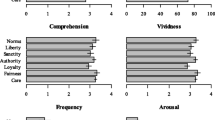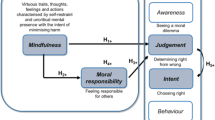Abstract
This paper considers the question of whether predictions of wrongdoing are relevant to our moral obligations. After giving an analysis of ‘won’t’ claims (i.e., claims that an agent won’t Φ), the question is separated into two different issues: firstly, whether predictions of wrongdoing affect our objective moral obligations, and secondly, whether self-prediction of wrongdoing can be legitimately used in moral deliberation. I argue for an affirmative answer to both questions, although there are conditions that must be met for self-prediction to be appropriate in deliberation. The discussion illuminates an interesting and significant tension between agency and prediction.
Similar content being viewed by others
Notes
Jackson (1991, p. 480).
This is somewhat unfortunate, since it does not bear any relation to other philosophical views which bear the same label.
Jackson and Pargetter (1986, p. 233).
Ibid.
Jackson and Pargetter (1986, p. 244). Note the similarity of this point to an objection which is often made to certain forms of Rule Consequentialism: namely, that the rules which would be best under conditions of ideal compliance might have bad or even disastrous consequences under partial compliance.
Zimmerman (1996, p. 193).
Jackson and Pargetter (1986, p. 240).
Perhaps the best way to understand this is by comparison with so-called ‘reparative obligations’. For example, if I break a promise to you, I have done something wrong, but this is not the end of the matter: my wrongdoing itself imposes additional obligations: to apologise to you, to try to make it up somehow, etc. The Actualist might be regarded as deriving these reparative obligations from the probability of future wrongdoing rather than the reality of past wrongdoing.
Jackson and Pargetter (1986, p. 242).
Thanks to an anonymous reviewer for suggesting this way of interpreting the objection.
Jackson and Pargetter (1986, 244n).
Zimmerman (1996).
Jackson and Pargetter (1986, p. 243).
It is also worth noting that there is nothing in the notion of subsidiary or hierarchical obligation which makes it immune from the objections levelled against Actualism above; insofar as there is any force in the claim that an obligation to say no is problematic because it involves (or sanctions) wrongdoing, this will apply to a subsidiary obligation as much as a primary one.
An anonymous reviewer has pointed out that we can still distinguish a subsidiary-obligation Possibilism (SO-Possibilism) from Actualism: of the set {say yes, say no}, the SO-Possibilist will hold that Procrastinate ought to say yes, while the Actualist will not. I do not think this will make much practical difference, especially for the purposes of this paper, since SO-Possibilists still acknowledge that Procrastinate has a (secondary) obligation to say no. In any case, I must say that I find the view rather odd. The obligation to say yes is arrived at either (a) by setting the value of options as the value of the best possible outcome, even when this is acknowledged to be unlikely (and when the relevance of this improbability is acknowledged), or (b) by making use of the principle of Distribution over & (If O(A&B), then O(A)), to which the case of Procrastinate (among others) is plausibly taken to be a counterexample. On this latter point, see Jackson (1985).
This example is from Humberstone (1983, pp. 22–23).
The need to consider examples like this one was suggested to me by Garrett Cullity.
Indeed, this was precisely the point Humberstone was attempting to make by introducing the Concentration Camp Doctor.
Obviously, claims about what an agent will do are interchangeable, mutatis mutandis, in this analysis with claims about what they won’t do. I use ‘won’t’ claims mainly because my focus is upon wrongdoing.
Jackson and Pargetter (1986, 241n).
Could we not, though, at least say that if an agent can’t Φ, it is certain that they won’t? No: where ‘can’t’ refers to an agent’s capacities—as it does here—it is possible that an agent might Φ despite lacking the capacity to do so, because of fluky psychological malfunction or external interference. On this, see Smith (2004, p. 123).
Smith (2004, pp. 123–124).
Obviously we are only concerned with predictions of wrongdoing because predictions that the agent will do everything they ought will result in the same moral obligations as could be derived without the use of predictions.
Jackson and Pargetter explicitly state that they are talking about objective obligations, but many other commentators do not say, even though they seem to focus on moral deliberation.
Jackson (1991, p. 471).
Smith (2004, p. 129).
Note that I am asserting only a biconditional between obligatoriness and advisability here, rather than making the stronger claim that the latter constitutes an analysis of the former.
Jackson and Pargetter (1986, p. 237).
I am grateful to an anonymous reviewer for pointing out the need for clarification here.
Jackson and Pargetter blur this distinction by first asking us to imagine that we are in a position to give Procrastinate advice, then claiming that the right advice is to tell him to say no. Zimmerman latches onto the second sense of advisability—what we ought to advise the agent to do—in arguing against the advisability-objective obligation connection. He is correct that this sense of advisability doesn’t track objective obligation, for the reasons I have given, but he doesn’t address the claim that an informed advisor would want Procrastinate to say no, and that the desires of an informed advisor do track objective obligation. See Zimmerman (1996, pp. 198–199).
Additionally, the fact that an ideal advisor would want an agent to Φ does not entail that we ought to advise them to Φ.
Many Possibilists explicitly make deliberation, rather than objective obligation, their target: e.g., Thomason (1981, p. 185); Humberstone (1983, p. 23); Carlson (1999, p. 265). Actually, Carlson claims that Actualism is implausible both as a ‘criterion of rightness’ and as a ‘method of deliberation’, but it is unclear which, if any, of his arguments are applicable to the former.
Could this be a problem? Fully informed and rational agents would not, on this view, be able to take predictions into account, yet we have said that their desires track objective obligations, and that these are influenced by predictions. But this is not in fact problematic: objective obligations are tracked by what our ‘ideal advisors’ would want us to do, not what they would want themselves to do. And because full rationality includes having desires that are proportional to the strength of one’s reasons, the ideally rational agent will always do what they have most reason to do, and their obligations will therefore not be influenced by predictions of future behaviour. However, there may be a different problem for such agents: Isaac Levi has argued that an assumption that one will choose rationally might render principles of rational deliberation vacuous. See Levi (1997, pp. 76–82).
Goldman (1978, p. 186).
In the original example, and in Jackson and Pargetter’s discussion of it, ‘don’t change’ is also broken down into two more specific options: don’t change and accelerate; don’t change and don’t accelerate. This is not relevant to my discussion so I have omitted the detail.
I owe to Philip Pettit the thought that there is a pragmatic contradiction lurking here, but I am not sure if my formulation is what he had in mind. Richard Moran also notices the connection between Moore’s Paradox and the kind of cases I am considering here. See Moran (2001, p. 83).
Thomason (1981, p. 185).
Thomason (1981, p. 181).
This appears to be the view of at least one Possibilist. See Thomason (1981, p. 186).
Moran (2001, p. 81).
A reviewer asks whether the claim must be confined to the judgement that it is subjectively wrong to use a self-prediction in deliberation, since I have argued that the Concentration Camp Doctor, for example, has an objective obligation to administer the anaesthetic on the basis of the prediction that he will operate. But this is a problem only if we think that, for any objective obligation, it must be objectively appropriate for agents to deliberate in a way which derives this obligation. And I deny this. The Concentration Camp Doctor (objectively) ought to administer the anaesthetic, but he (objectively) ought not to deliberate in a way which would result in his deriving this obligation. This means that in some cases, agents who only deliberate appropriately would not be able to discover all of their objective obligations.
Similarly, we would not give Procrastinate the advice to say yes then write (in addition to the advice to say no), since we have already determined that the option set to which that ought is relative is not relevant to his current choice: we have already determined that he won’t do it.
Note that this does not mean it’s not still an obligation! It just means that the option-set in which this option figures is not the one he is deliberating about.
See the related discussion in Moran (2001, pp. 79–83).
References
Bergström, L. (1977). Utilitarianism and future mistakes. Theoria, 43(2), 84–102.
Bykvist, K. (2002). Alternative actions and the spirit of consequentialism. Philosophical Studies, 107, 45–68. doi:10.1023/A:1013191909430.
Carlson, E. (1999). Consequentialism, alternatives, and actualism. Philosophical Studies, 96, 253–268. doi:10.1023/A:1004239306956.
Carlson, E. (2002). Deliberation, foreknowledge, and morality as a guide to action. Erkenntnis, 57, 71–89. doi:10.1023/A:1020146102680.
Goldman, H. S. (1976). Dated rightness and moral imperfection. The Philosophical Review, 85(4), 449–487. doi:10.2307/2184275.
Goldman, H. S. (1978). Doing the best one can. In A. Goldman & J. Kim (Ed.), Values and morals (pp. 185–214). Dordrecht: D. Reidel.
Greenspan, P. S. (1975). Conditional oughts and hypothetical imperatives. The Journal of Philosophy, 72(10), 259–276. doi:10.2307/2024734.
Humberstone, L. (1983). The background of circumstances. Pacific Philosophical Quarterly, 64, 19–34.
Jackson, F. (1985). On the semantics and logic of obligation. Mind, 94(374), 177–195. doi:10.1093/mind/XCIV.374.177.
Jackson, F. (1991). Decision-theoretic consequentialism and the nearest and dearest objection. Ethics, 101(3), 461–482. doi:10.1086/293312.
Jackson, F., & Pargetter, R. (1986). Oughts, options, and actualism. The Philosophical Review, 95(2), 233–255. doi:10.2307/2185591.
Kennett, J., & Smith, M. (2004). Philosophy and commonsense: The case of weakness of will. (Reprinted in Ethics and the a priori). Cambridge: Cambridge University Press.
Levi, I. (1977). Consequentialism and sequential choice. (Reprinted in The covenant of reason). Cambridge: Cambridge University Press.
Moran, R. (2001). Authority and estrangement: An essay on self-knowledge. NJ, USA: Princeton University Press.
Schick, F. (1988). Self-knowledge, uncertainty, and choice. In Peter Gardenfors & Nils-Eric Sahlin (Eds.), Decision, probability and utility: Selected readings. Cambridge: Cambridge University Press.
Smith, M. (2004). Rational capacities, or: How to distinguish recklessness, weakness, and compulsion. (Reprinted in Ethics and the a priori). Cambridge: Cambridge University Press.
Sobel, J. H. (1976). Utilitarianism and past and future mistakes. Nous (Detroit, Mich.), 10, 195–219. doi:10.2307/2214575.
Thomason, R. H. (1981). Deontic logic and the role of freedom in moral deliberation. In R. Hilpinen (Ed.), New studies in deontic logic (pp. 177–186). Dordrecht: D. Reidel.
Vorobej, M. (2000). Prosaic possibilism. Philosophical Studies, 97, 131–136. doi:10.1023/A:1008349904432.
Zimmerman, M. J. (1996). The concept of moral obligation. Cambridge: Cambridge University Press.
Acknowledgements
I am grateful to an anonymous reviewer for some very helpful and challenging comments which have, I believe, led to significant improvements in this paper.
Author information
Authors and Affiliations
Corresponding author
Rights and permissions
About this article
Cite this article
Louise, J. I won’t do it! Self-prediction, moral obligation and moral deliberation. Philos Stud 146, 327–348 (2009). https://doi.org/10.1007/s11098-008-9258-5
Received:
Accepted:
Published:
Issue Date:
DOI: https://doi.org/10.1007/s11098-008-9258-5




